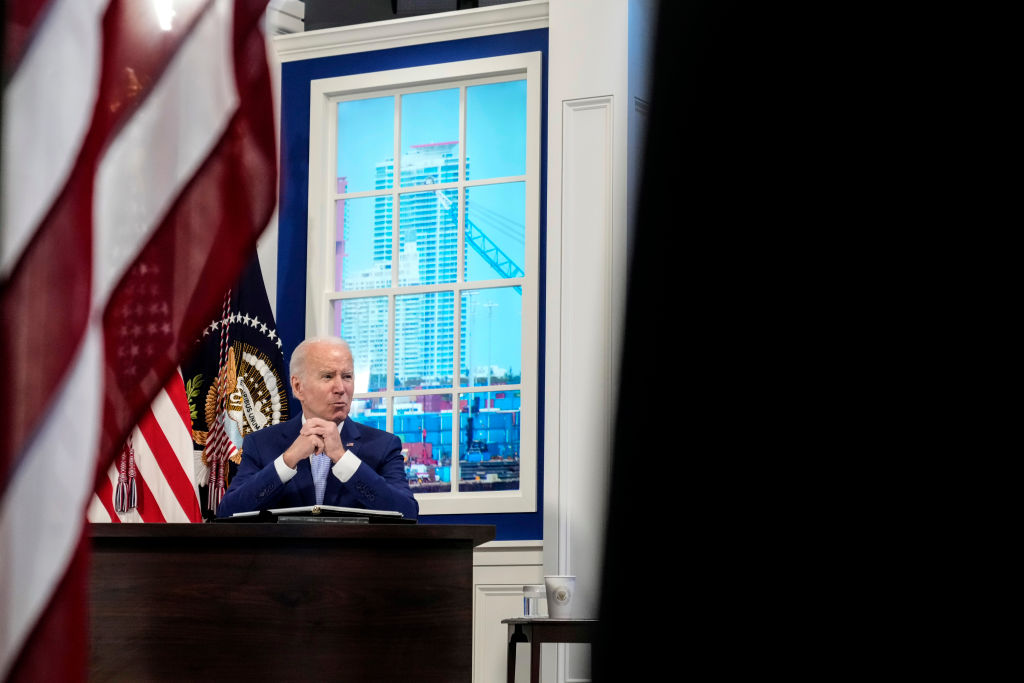
A farmer drives a cotton picker in Xinjiang Uygur Autonomous Region, China, October 15, 2021. /Getty
A farmer drives a cotton picker in Xinjiang Uygur Autonomous Region, China, October 15, 2021. /Getty
Editor's note: Bobby Naderi is a London-based journalist, guest contributor in print, radio and television, and documentary filmmaker. The article reflects the author's opinions, and not necessarily the views of CGTN.
The outdated policy of sanctions and pressure continues to be a traditional tool that the U.S. government uses as a shortcut to thinking and cooperation on a planet that's threatening to come down around our ears. The less there is to justify a traditional custom, the harder it is to get rid of it.
U.S. President Joe Biden has signed a bill into law that bans all imports from China's Xinjiang Uygur Autonomous Region over allegations of forced labor and human rights violations. The alleged Uygur Forced Labor Prevention Act will have a significant impact on U.S. companies who do business in the region. It gets worse. Most of the claims of forced labor in Xinjiang come from the Australian Strategic Policy Institute, a think tank whose funders include the Pentagon, Boeing and Lockheed Martin.
The U.S. government needs to constantly remind itself about its outdated policy of sanctions and pressure. The difference between the Congress and an Australian think tank is that the Congress knew it was being lied to. The new anti-China law demonstrates the pertinence of that truth.
Giving in to flinching from failures
It is time to do that most difficult thing though; to step back and take a cold look at the White House officials and Congress. What we find is that they will do anything to appease the cult of the military-industrial complex. Whether they care to admit it or not, this is commonly done by the lucrative career of supporting scapegoating, sanctions, arms race, trade war and naval transgressions. The Chinese case is not extreme, and it must not be seen in isolation.
It is venerable, time-tested and seemingly true that the Republicans and Democrats are a divided people, but let's not make too much of this, for they display a striking unity in the tendency to blame China for their difficulties, shortcomings and failures in almost everything. After all, they always give in to flinching from failures that are all their own – trade wars, anti-terror wars and sanctions.
We are on notice now: Just like their predecessors, the Biden administration and its congressional cronies want to hold their ground in a disastrous campaign. Media hypes notwithstanding, elements within the Pentagon, the national-security apparatus, the Capitol Hill bureaucracy and the military-industrial complex will go to any lengths to prevent whatever kind of détente with China the American public may have in mind. They need a hostile world and they will live in one even when U.S. companies and people insist otherwise.

U.S. President Joe Biden speaks during a meeting in the South Court Auditorium of the White House in Washington, D.C., December 22, 2021. /Getty
U.S. President Joe Biden speaks during a meeting in the South Court Auditorium of the White House in Washington, D.C., December 22, 2021. /Getty
Dumbed-down transgressions
U.S. officials play the victim in geopolitical domains as well. For example, the U.S. public is continually being told that the legal presence of Chinese naval forces in the South China Sea is a major crisis-inducing provocation of the U.S. over the Taiwan region. Unsurprisingly, U.S. officials refuse to remind the public about their outdated Cold War policy that provides vital context for this risky situation.
Playing the victim is like eating bad food – it will make you feel and look worse in the long run. American officials don't want to take responsibility (a classic sign of victim behavior) for the deterioration of China-U.S. ties. They have trouble accepting that the U.S. Navy has contributed to the insecurity of the South China Sea and the greater region. They refuse to accept responsibility for the circumstances they are in. Instead, they hold on to their grudges, point the finger at Beijing and ignore their undeniable role.
What's the remedy here? Well, every circumstance offers American officials an opportunity for growth. Unfortunately, the world is still dealing with a government experiencing a political charade and powerlessness.
Being a victim of U.S. sanctions is not the only reason Beijing doesn't trust Washington. This is a problem of American officials not believing they are trustworthy themselves. They may never know when to say enough is enough as regards their outdated China policy. Why not learn to avoid thinking that the U.S. is the only country in the world that has to deal with world peace and security, or human rights? Surely, U.S. politicians can recognize they have a choice over whether they allow themselves to critically enter into petty arguments and allegations, or trap themselves in the victim role and prolong a self-defeating conflict.
Confession time: Why not also undergo some major rewiring, move beyond the geopolitical divides and games and avoid thinking that they are perfect in human rights norms and moral standards? Surely, U.S. officials can also remove the word "perfect" from their vocabulary and accept that they are not perfect and they will always make mistakes as regards alleged "forced labor and genocide" in Xinjiang.
As the embassy of China in the U.S. said, this arrogance and narcissism "ignores the truth and maliciously slanders the human rights situation in Xinjiang," a major cotton producer and supplier of the world's materials for solar panels. It also prevents Washington from having a truly trustworthy and cooperative partnership and conversation with China.
(If you want to contribute and have specific expertise, please contact us at opinions@cgtn.com.)

